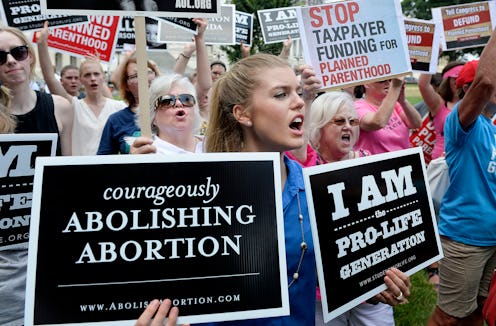News
Judge Blocks Planned Parenthood Video Release
A San Francisco federal judge blocked video footage of Planned Parenthood executives that had been slated to be released by anti-abortion activists on Friday afternoon, giving the nonprofit a temporary reprieve from the media circus surrounding earlier videos released by the activists. Any additional, unreleased footage would also be barred from release, Judge William Orrick stated. The group responsible for the footage, the Center for Medical Progress, has accused Planned Parenthood of illegally selling tissue and organs from aborted fetuses for cash and has used the videos as evidence to back their claims.
The judge also granted a restraining order requested by the National Abortion Federation (NAF), citing possible "harassment, intimidation, violence, invasion of privacy, and injury to reputation" in his three-page decision. Any damage done to targeted organizations and the employees and members under their care, would be "irreparable," he wrote.
"The safety and security of our members is our top priority," explained NAF president Vicki Saporta to AP reporters on Friday. "That security has been compromised by the illegal activities of a group with ties to those who believe it is justifiable to murder abortion providers." The NAF has alleged that the Center for Medical Progress "infiltrated" its meetings and secretly recorded interactions with various members without their knowledge.
Center for Medical Progress leader, David Daleiden (who was specifically named in the lawsuit filed by the NAF), claimed that the move was meant to "silence [the group's] First Amendment rights" and stymie investigative journalism. The pro-life group, stated Daleiden, would continue to "contest all attempts from Planned Parenthood and [its] allies." Bustle has reached out to Daleidan and the Center for Medical Progress for comment on the issue and is awaiting a response.
Daleiden and his group have previously accused Planned Parenthood of haggling over the price of individual fetuses, attempting to hide its practices and procedures, and committing a felony in its requests for payment per specimen, which the Center for Medical Progress says is "punishable by up to 10 years in prison or a fine of up to $500,000" in accordance to current law.
Unfortunately for Daleidan, the video footage itself, which was taken during NAF's annual meeting in mid-July, may have been problematic from the get-go. Professor John Nockleby, of Loyola Law School in Los Angeles, Calif., explained to AP reporters that different states held different privacy laws which could impact the outcome of a ruling like the one handed down on Friday. California's privacy laws, he said, were much stricter than others, including a requirement that all parties involved in any recordings must be informed ahead of time that they will be taped.
According to Saporta, the NAF had made it explicitly clear ahead of the conference that all proceedings withing the meeting should be kept confidential.
Images: Getty Images (1)
